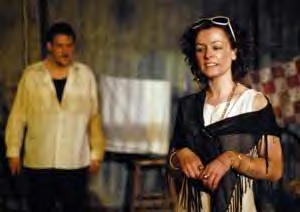Stars in the Morning Sky at the Union Theatre
In the run up to the Moscow Olympics, city officials are preparing for their international guests by, amongst other things, tightening up on prostitution.

The play focuses on a sleepy backwater town inundated with working girls who've been forced out of the city.
Alexander Galin's play is difficult because its gritty realist thrust makes best sense in terms of its original context – the political unrest and censorship of 1980's Russia. It's not quite close enough to the London of 2007 to make updating it an easy task, yet not quite far enough away to hold together as an historical artefact. So in the midst of all these somewhat distant references, the Union's production seems to want to concentrate on the emotional drama that ensues when four girls descend on a single room in a second rate hostel.
Unfortunately the piece never quite gets enough of a grip on characterisation and motive to hang together without a concrete context. The cast move well (staging is often more articulate than the dialogue) and the mood is perfect at times, but the piece is really let down by its lack of precision in bringing out the details of the script. Scenes too often flail and flounder as the performers recite their lines without it being clear who they're talking to and why.
This isn't to detract from some exhilarating performances, especially after the interval. – I could watch Cassie Raine as Laura, who considers herself a cut above your average pro, hold the limelight all day long, but there are riches galore to distract from her glittering poise! Jan Hirst has a wonderfully grudging presence as Valentina, reluctant hostess to the influx of working girls. Kate Bowes Renna is sympathetic and funny and achieves the difficult task of playing a commoner without being plain patronising.
Director Aoife Smyth's naturalistic approach is appropriate to the text, but occasionally seems blind to moments where it might help to be more 'theatrical' – at points the script is quite self-aware (the irony of Laura's comment "this is turning into quite an exciting evening isn't it?" for example), but there's only the slightest glimmer of a chance that Raine will step through the fourth wall and address the audience! Incongruous overlaid music gave me quite a filmic sensation at points – an interesting effect for a piece of theatre to achieve!
One of the most affective (and hackneyed) devices in Galin's writing is its juxtaposition of light and dark moods, his characters alternately finding the courage to make light of their suffering and being helpless to escape it. There is something of this in Kate Bowes Renna's astute comic touch. But too often the cast don't seem to know where to lighten the tone and where to 'play it straight'. Moments of tragic climax became ironically humorous because the foreplay has been so muddled.
Having said all that, the inspiration behind recuperating Galin starts to shine through in some wonderfully melodramatic moments. Detractors can all too easily dismiss a play like this one as slushy sentimentalism and then return to their emotionally retarded sense of superiority. But what's the use of theatre that appeals to our hard, masculine, intellectual appreciation (look at the success of Frost/Nixon at the Gielgud, a play that centres on justice and politics for example) at the expense of its tender, emotional side?
There are moments here that pitch us into the subjective worlds of characters with incredible immediacy. When dialogue, character and dramatic momentum do coincide the effect is compelling, and I wish it had happened more often. An assured sense of which character has become the focus of the action at any particular point would be invaluable in achieving greater overall coherence.
This is a show that has the potential to be fantastic and will only get better with time. See for yourself.
Comments
Share
The SE1 website is supported by people like you
Follow us
Email newsletter
For the latest local news and events direct to your inbox every Monday, you need our weekly email newsletter SE1 Direct.

